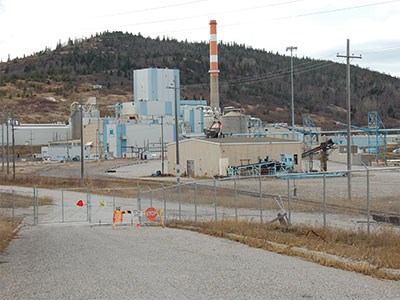The potential American buyers of the former Marathon Pulp mill have missed a critical deadline to close the sale of the contaminated property from Tembec.
A final Jan. 22 deadline, imposed by the Ministry of Environment (MOE), to complete the transaction and transfer of the industrial land to Green Investment Group Inc. (GIGI) has come and gone.
Ministry spokeswoman Lisa Brygidyr said GIGI, an Illinois-based brownfield redeveloper, was unable to commit to fulfilling the necessary environmental requirements to clean up the mill property for the long term.
“The conditions of the sale agreement were not met.”
Brygidyr said all the parties signed off on a sale agreement last year and a final closure date this month after repeated extensions were granted by the ministry.
That doesn’t mean the sale of the property won’t proceed, she said, but Tembec and GIGI will have to come back to the ministry with a new sale agreement with terms and conditions requiring MOE approval.
How long that process will take to work through is unknown.
Because the property on the northeast shore of Lake Superior was heavily contaminated, the MOE had final say on its transfer to any potential new owner who had the means and track record to carry out the cleanup work.
Ministry oversight was a condition outlined in a 2011 settlement agreement between the province and Tembec, the mill’s former owner, which operated the mill until bankruptcy forced its closure in 2009.
Brygidyr would not comment on the details of the business arrangement, but said certain financial requirements needed to be in place in order for the ministry’s approval of the sale.
Both companies agreed to set aside a combined $6.8 million as financial assurance for the cleanup; $4.8 million from Tembec and $2 million from GIGI.
Brygidyr said Tembec has posted its money, GIGI has not.
Established in 2005, GIGI has acquired other brownfield properties across North America, including some former Smurfit-Stone paper mills in New Brunswick and Quebec.
The company portrays itself as performing environmental site cleanups on vacated and heavily contaminated industrial properties, then marketing to and attracting small companies engaged in green business manufacturing.
GIGI president Ray Stillwell did not respond to requests for an interview, but Gerry Philippe, his vice-president of Canadian operations, responded by email that the company remains in play.
“Green Investment Group continues to work diligently on several approaches to get this deal done. We are confident Tembec and the Ontario MOE will want to move forward based on approaches that we continue to pursue, but cannot divulge any of them at the present time as they are subject to approvals by parties involved.”
Tembec, through its vice-president of corporate affairs, Linda Coates, offered no response.
Cleaning up the Marathon Pulp mill has been a long and drawn-out process. The property was identified as an environmental hotspot due to industrial sewage system leakages that caused a number of spills into Marathon harbour between 2009 and 2011.
Tembec, a co-owner of the mill, had disputed a provincial order requiring the Montreal forest products giant to be in care and control of the property.
Under a potential new arrangement, GIGI would be responsible for any current environmental issues, while Tembec remains on the hook for any unforeseen future problems.
The ministry signed off on the sale to GIGI last May, subject to those terms and conditions being met.
The original closing date was scheduled for the end of last August, but the parties involved asked for, and received, three extensions from the ministry in order to carry out some due diligence work.
“We granted (them) 90 days and said that will be it,” said Brygidyr. “The existing agreement and the final closure date were set in stone.”
She said both Tembec and GIGI knew of their obligations.
“We haven’t really heard too much from either party to date.”
The onus is now on Tembec to finish the cleanup work which includes demolition and decommissioning of mill buildings, a sewage basin, a pipeline, plus putting the appropriate safeguards in place for long-term monitoring of the site.
“We gave (Tembec) two years to do that and if they hadn’t done that by end of December (2013), they were required to begin remediation work,” said Brygidyr. “They don’t have to complete it, but they have to start it.”
She said Tembec could potentially produce another interested purchaser.
“They could come to us with a whole new agreement and we will go through the process again.”
She said the ministry is not aware of what Tembec’s plans are to market or find a new buyer.




